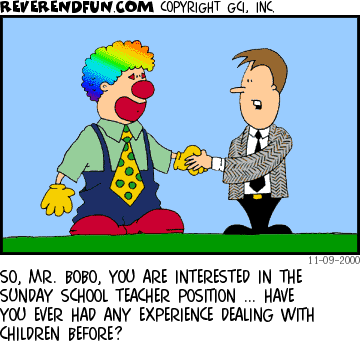
Welcome to a continuing series of tips on working with large groups of children. I hope that you will find these tips useful and be able to implement them in your dealings with large groups of kids. If you do, please leave a comment and let us know. For a complete list of posts in this series, please see the index page. So, without further introduction, here is today’s installment.
Large groups all have some sort of discipline system. Whether it is spoken or reduced to writing, any large group of people has its own discipline system or it devolves into chaos and anarchy. We set up a system in our classroom when we were having problems with the kids interrupting and talking too much during the large group lesson. I will not go into the details the system, but suffice to say that there are four key components to any good discipline system:
- First, set up your system as a reward system. Don’t punish the kids for not doing something they should – reward them for doing what you do ask.
- Two, keep it simple. If the system gets so complex that you can’t administer it and the kids can’t remember it, then it doesn’t do anyone any good.
- Three, communicate the system clearly to the kids. They need to understand exactly how the system works, what they can and can’t do, and what the rewards are.
- Finally, don’t enforce it yourself during the large group teaching time unless you have no other option. This may seem a bit counterintuitive, but if you have to interrupt your large group teaching every time a kid can’t keep his hands to himself, it will destroy the flow of your teaching and reduce its effectiveness. Rely on other leaders and volunteers to enforce the discipline system. Make the system clear to them as well, and ask for their help!
Remember, discipline is about discipling a child, and having a system in place is as much about the other kids in the room as the child who is receiving the discipline. Many people don’t want to implement a discipline system because they want the kids to “have fun” in their classrooms. This view ignores two important considerations:
- It ignores the other kids in the room who are not acting out and deserve a secure and controlled learning environment in which they can learn about Jesus and God’s word.
- It ignores that fact that most kids who act out actually desire rules and a controlled environment – no matter what they tell you!
Return to the Tips for Large Group Teaching in Children’s Ministry index page.

